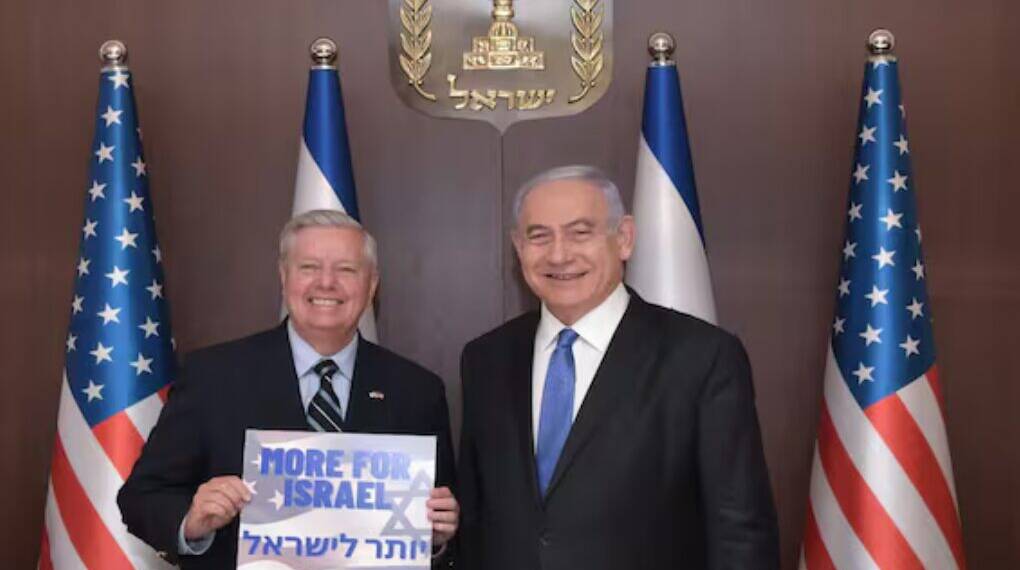U.S. Senator Lindsey Graham recently outlined a stark new strategy for Israel in its war against Hamas, emphasizing that diplomatic solutions are increasingly unlikely. Graham stated that Israel is preparing to “take the place by force then start over again,” likening Israel’s planned military operations in Gaza to the total Allied campaigns against Tokyo and Berlin during World War II. This analogy underscores a shift toward a full military confrontation aimed at completely dismantling Hamas’s control over Gaza.
A Militarized Strategy: From Tokyo and Berlin to Gaza
Graham’s remarks reflect an evolution in both Israeli and US thinking about how to resolve the conflict. He explicitly linked Israel’s strategy to the Allied post-World War II efforts in Tokyo and Berlin, which involved massive destruction, occupation, and subsequent reconstruction. As he explained to NBC’s Kristen Welker:
“I think Israel’s come to conclude that they can’t achieve a goal of ending the war with Hamas that would be satisfactory to the safety of Israel and that they’re going to do in Gaza what we did in Tokyo and Berlin — take the place by force, then start over again, presenting a better future for the Palestinians, hopefully having the Arabs take over the West Bank and Gaza.”
This vision implies a long-term Israeli occupation and reorganization of Gaza, akin to the US-led governance and reconstruction of Japan and Germany following their defeat.
Humanitarian Crisis Deepens Amid Military Campaign
Graham’s comments come as the humanitarian situation in Gaza has reached critical levels. According to a recent U.N. World Food Programme official, about a quarter of Gaza’s population is facing famine-like conditions. International figures, including Democrats, global partners, and even cultural figures like podcaster Theo Von, are urgently appealing to the US and Israel to expand humanitarian aid into Gaza.
On the ground, Israel’s military temporarily paused fighting in three major population centers within Gaza to facilitate increased humanitarian aid deliveries; airdrops of essential supplies have resumed. Graham reassured that Israel will coordinate with the U.N. and the World Food Programme to provide much-needed food aid to civilians:“Israel is going to work with the U.N., the World Food Programme, to get some food into these people, who need it.”
Diplomatic Deadlock and the Collapse of Negotiations
Despite signs of humanitarian concern, diplomatic efforts appear increasingly futile. The White House recently withdrew from ceasefire negotiations with Hamas, citing bad faith and lack of coordination by the militant group. Special Envoy Steve Witkoff remarked that Hamas “does not appear to be coordinated or acting in good faith,” reflecting growing frustration on the US side.
President Donald Trump reinforced this view, characterizing Hamas militants as seemingly suicidal:
“I think they want to die,” Trump told reporters.
Graham agreed with Trump’s assessment, characterizing Hamas as a terrorist organization “chartered to destroy the state of Israel” and stated bluntly:
“They’re religious Nazis.”
This rhetoric not only demonizes Hamas but also signals why Graham and some US leadership see negotiation as impossible.
Historical Context: Israeli Occupation and Periodic Military Operations in Gaza
Israel first occupied Gaza during the 1967 Six-Day War and maintained a military presence until its unilateral withdrawal in 2005. Since then, Israel has conducted periodic military incursions to counter Hamas, which controls Gaza and continues to engage in hostilities. The renewed strategy suggested by Graham involves a full takeover of the Gaza Strip, moving beyond limited military responses to a comprehensive occupation and administrative control.
Graham’s framing highlights several key strategic points:
End of Negotiation as a Viable Option: Both the US administration and Israel appear to have abandoned hopes for a negotiated peace with Hamas.
Full Military Effort: Israel plans to escalate its military campaign to decisively dismantle Hamas’s governance in Gaza, similar to the Allied “finish the job” approach after WWII.
Post-Conflict Reconstruction: The idea of “starting over” implies a rebuilding phase, potentially with Arabs managing West Bank and Gaza governance, signifying a reimagining of Palestinian self-rule under new auspices.
This hardline stance also aligns with domestic US politics, where figures like Graham and Trump maintain strong support for Israel’s right to defend itself and view Hamas as an existential threat.
Ethical and Humanitarian Considerations
Invoking the WWII bombings of Tokyo and Berlin is highly provocative because those campaigns involved massive civilian casualty rates and destruction of residential areas. The analogy suggests Israel may adopt similarly overwhelming force in Gaza, with predictable humanitarian consequences.
While Israel and the US have expressed intent to facilitate humanitarian aid alongside military operations, the looming risk of large-scale civilian suffering raises urgent moral dilemmas about proportionality and international humanitarian law compliance.
A Pivotal Moment with Far-Reaching Consequences
Senator Lindsey Graham’s statements frame the current phase of the Gaza conflict as a watershed moment, where military action is prioritized over diplomacy and a transformative occupation and reconstruction of Gaza are envisaged. This hardening policy stance highlights a significant shift in US and Israeli approach, grounded in the conviction that Hamas poses an irreconcilable threat.
As Gaza faces catastrophic humanitarian conditions and peace talks collapse, the coming weeks may witness a decisive, and potentially devastating, escalation. The long-term outcomes—whether genuine peace or protracted instability—will depend on how this military strategy unfolds and how it balances justice, security, and human rights amidst the conflict.








